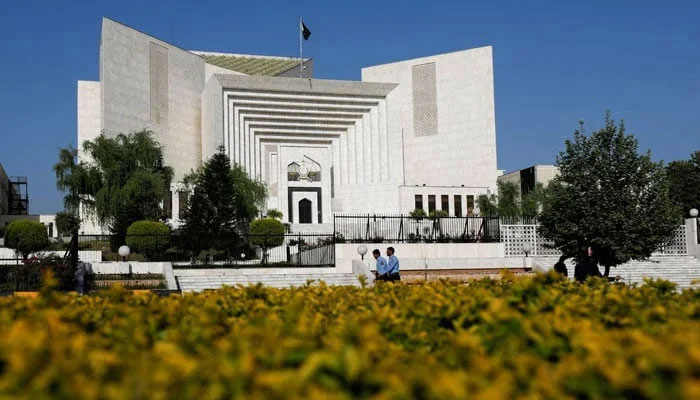The 26th Amendment in judicial focus: Part – II
In democratic manner, houses of parliament should have devoted ample time to debate proposed amendment
After the ouster of Imran Khan as prime minister through a no-confidence motion in April 2022, the judicial landscape became even murkier. While there were over 55,000 cases pending in the apex court, it had to deal with more and more constitutional petitions at the cost of other cases.
While contempt of court proceedings were suggested against Imran Khan when he disobeyed the top court’s orders not to protest at D-Chowk, Justice Bandial showed reluctance to take action against Imran Khan and sought reports from intelligence agencies on whether Imran was informed about the apex court’s order.
Then there was also a question of like-minded judges who sat on most of the benches that heard constitutional cases and delivered controversial judgments.
In 2022, the Pakistan Democratic Movement (PDM) government amended the country’s accountability laws and introduced changes to the National Accountability Ordinance (NAO) 1999. It reduced the terms of the NAB chairman and prosecutor general to three years and limited NAB’s authority to cases involving amounts over Rs500 million. By doing so, the PDM government tried to put limits on these offices and their seemingly unlimited powers, and also transferred pending cases and investigations to other authorities. Imran Khan challenged these amendments in the Supreme Court claiming that the government designed these changes to benefit influential figures and legitimise corruption.
His petition argued that the amendment would scrap corruption cases against top officials such as the president, prime minister, chief ministers, and ministers. In September 2023, just days before then CJP Bandial’s retirement, the Supreme Court delivered a 2-1 verdict to restore corruption cases against public officials and upheld the maintainability of Imran’s plea. Exactly one year later, in September 2024, under CJP Isa the Supreme Court overturned the Bandial verdict and upheld the NAB amendments.
The parliament that the PDM government led also passed the Supreme Court Practice and Procedure Act in April 2023, but Chief Justice Bandial withheld its operation on the petition stating that the law was unconstitutional and violated the independence of judiciary. The most significant provision of this Act read as follows: “Every cause, appeal or matter before the Supreme Court shall be heard and disposed of by a bench constituted by the Committee comprising the Chief Justice of Pakistan and two most senior judges, in order of seniority and the decision of the committee shall be by majority.”
This effectively curtailed the CJP’s power to form benches of like-minded judges. Chief Justice Qazi Faez Isa assumed office in September 2023 and served for 13 months. When Justice Faez Isa assumed the office of the CJP he objected to the NAB amendment case verdict by Justice Bandial and suggested that the proceedings could restart if the counsel presented a strong case, as earlier proceedings didn’t meet the standards of the Supreme Court (Practice and Procedure) Act 2023.
In October 2023, Justice Isa led the Supreme Court to rule that the SC (Practice and Procedure) Act 2023 – requiring a committee of senior judges to form benches – was constitutional and rejected petitions against the law with a 10-5 majority verdict. Like-minded judges such as Ijazul Ahsan, Munib Akhtar, Mazahar Ali Naqvi, Ayesha Malik, and Shahid Waheed dissented.
In May 2024, Justice Ayesha Malik in an additional 32-page note ruled that parliament lacked the legislative competence to pass the SC (Practice and Procedure) Act 2023. “The rule-making power under Article 191 of the Constitution exclusively falls within the domain of the Supreme Court and is directly linked with the independence of the judiciary.”
All this shows that the problem of regulating the affairs of the top court has consistently been a bone of contention between the legislature and the judiciary. Justice Faez Isa’s tenure was much better than that of the previous CJs. Justice Isa had suffered a lot at the hands of the powers-that-be who favoured Imran Khan and targeted anyone who opposed or disagreed with him. The PTI had also filed a presidential reference against Justice Isa – perhaps at the behest of interventionist elements.
An undue interest of the judiciary in political matters and even taking executive decisions called for some major reforms in the practices and procedures of the judiciary and judicial appointments. Justice Isa inherited a divided judiciary and a much more assertive establishment. Chief Justice Isa’s decisions in PTI-related cases were strictly by the book and drew criticism from PTI supporters.
His verdict in the ‘election symbol’ case was based on solid legal grounds but since it went against the PTI, there were many who criticised the decision. The same applies to the ‘reserved seats’ case and the individual cases of recounts. In March 2024, six Islamabad High Court judges in a letter to the Supreme Judicial Council accused the country’s intelligence agencies of interference in judicial affairs and attempting to apply pressure on judges. The letter mentioned seven specific instances of alleged interference. Though the letter was addressed to Justice Isa, he could not stand behind the six judges.
Perhaps the best outcome under Justice Isa was when the court in 2024 declared that former prime minister Z A Bhutto did not get a fair trial by the Lahore High Court and the Supreme Court in 1978-79.
By the time Justice Isa reached his superannuation, he had many critics who had once supported him. And now we come to the 26th Amendment. Prior to the passage of the 26th Amendment, parliament has since 1973 passed 22 amendments, whereas three amendments could not pass through both houses for various reasons – the ninth amendment of 1985 under Junejo government, the eleventh amendment of 1989 under the first Benazir government, and the fifteenth amendment under the second Nawaz Sharif government in 1998.
The 26th Amendment introduced institutional changes that are fairly significant and will have a deep impact on the functioning of the judicial system in the country. Critics of the amendment pointed out that it shook the very structure of the Supreme Court and the high courts with an overwhelming level of political influence that will dictate the administration and dispensation of justice. They said that the new process of judicial appointments was likely to erode the capacity of the judiciary to function effectively and its independence might encounter checks nearly at every stage by other branches of the state. To them, protecting human rights would also be much harder with the 26th Amendment in place.
In a democratic manner, both houses of the parliament should have devoted ample time to debate the proposed amendment, but the Senate passed the 26th Amendment within hours after its introduction on October 20 and by early morning on Oct 21 both houses had approved the amendment. That was followed by the president’s assent and the official publication in the gazette the same day.
It was disappointing to note that the final draft of the amendment was not accessible to the public for consultation and in fact no deliberations were open for any fruitful and interactive dialogue among various segments of society that were likely to be on the receiving end of this amendment.
To be continued...
The writer holds a PhD from the University of Birmingham, UK. He tweets/posts @NaazirMahmood and can be reached at: mnazir1964@yahoo.co.uk
-
 Detective Chief Inspector Reveals How Andrew Got Treated In Police Custody
Detective Chief Inspector Reveals How Andrew Got Treated In Police Custody -
 Gemini 3.1 Pro Unveiled: Google’s Next-gen AI For Advanced Reasoning & Faster Enterprise Workflows
Gemini 3.1 Pro Unveiled: Google’s Next-gen AI For Advanced Reasoning & Faster Enterprise Workflows -
 Oprah Winfrey Talks About Weight-loss 'tool To Manage' Health
Oprah Winfrey Talks About Weight-loss 'tool To Manage' Health -
 Texas Emerges As World's Future Data Center Capital
Texas Emerges As World's Future Data Center Capital -
 South Korea’s Ex-President Yoon Issues Public Apology After Being Sentenced To Life Over Martial Law
South Korea’s Ex-President Yoon Issues Public Apology After Being Sentenced To Life Over Martial Law -
 Eric Dane Recorded Episodes For The Third Season Of 'Euphoria' Before His Death From ALS Complications
Eric Dane Recorded Episodes For The Third Season Of 'Euphoria' Before His Death From ALS Complications -
 Inside Morning Of Andrew’s Arrest And How He Responded: ‘Do You Know Who I Am?’
Inside Morning Of Andrew’s Arrest And How He Responded: ‘Do You Know Who I Am?’ -
 OpenAI Sam Altman Predicts AI Superintelligence By 2028: Is Humanity Ready For A Turning Point?
OpenAI Sam Altman Predicts AI Superintelligence By 2028: Is Humanity Ready For A Turning Point? -
 WhatsApp Rolls Out Group Message History To Ease Group Chats
WhatsApp Rolls Out Group Message History To Ease Group Chats -
 Tesla Expands Cybertruck Lineup With Affordable Model In US, Slashes Cyberbeast Price To Boost Demand
Tesla Expands Cybertruck Lineup With Affordable Model In US, Slashes Cyberbeast Price To Boost Demand -
 AI Is Not As Powerful As We Think, Says Mathematician Hannah Fry
AI Is Not As Powerful As We Think, Says Mathematician Hannah Fry -
 How Andrew's Feeling Since His Arrest & Subsequent Release Amid Tech & Computers Seize
How Andrew's Feeling Since His Arrest & Subsequent Release Amid Tech & Computers Seize -
 Trump Officially Directs US Agencies To Identify And Release Files On Extraterrestrial Life
Trump Officially Directs US Agencies To Identify And Release Files On Extraterrestrial Life -
 2026 Winter Olympics: Alysa Liu Claims Gold, Snapping 20-year Drought For US Figure Skating
2026 Winter Olympics: Alysa Liu Claims Gold, Snapping 20-year Drought For US Figure Skating -
 Hilary Duff Opens Up About Marriage Fears Despite Strong Bond With Matthew Koma
Hilary Duff Opens Up About Marriage Fears Despite Strong Bond With Matthew Koma -
 ‘Grey’s Anatomy’ Star Eric Dane Breathes His Last At 53
‘Grey’s Anatomy’ Star Eric Dane Breathes His Last At 53




